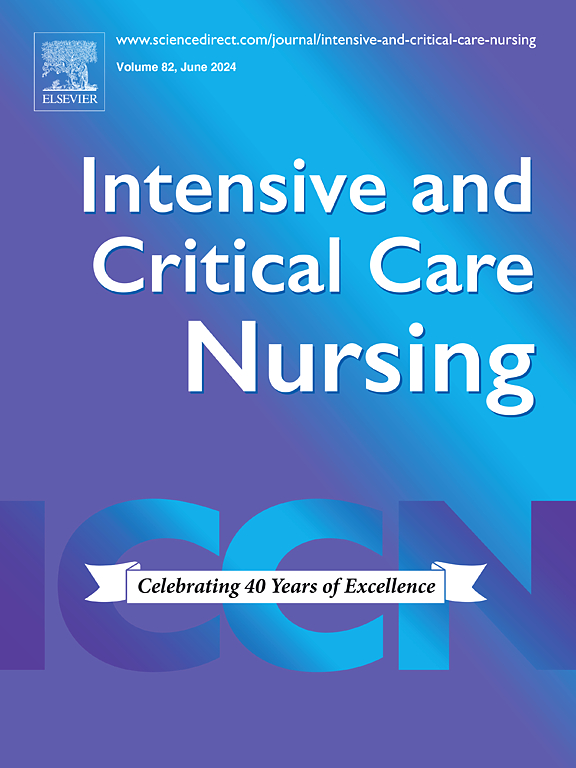重症监护卫生专业人员精神护理能力评估:一项综合综述
IF 4.9
2区 医学
Q1 NURSING
引用次数: 0
摘要
目的:本研究的主要目的是评估在重症监护病房工作的护士和卫生专业人员的精神护理能力,以及这些能力如何影响临床实践。作为次要目标,我们讨论了在纳入的研究中纳入和教授这些能力的优势、劣势和威胁。方法:在Embase、Web of Science、Medline/PubMed、PsycInfo、LILACS和Cochrane等数据库中对以英语、西班牙语和葡萄牙语发表的研究进行综合综述。结果:共纳入2239篇文献中的11篇。以护士为研究对象,以“精神护理态度”和“与知识相关的灵性”为主要胜任力。这些研究分为三个主题:“优势”、“劣势”和“机遇”。结果表明,在icu工作的专业人员面临着一些挑战,包括缺乏时间、高工作量和文化背景的影响。此外,很少有专业人士真正接受过在重症监护病房提供精神护理的培训,而且这种护理通常只在生命结束时提供。尽管有这些证据,但只有一项关于ICU主题培训的准实验研究被确定,而没有试验,这加强了对更多教育研究的需求。结论:在重症监护环境中,精神关怀仍存在较大差距,这往往与团队缺乏培训和知识有关。探索由卫生专业人员提供的精神护理所涉及的能力是深化卫生保健相关科学场景内辩论的一种方式。对临床实践的影响:基于对这些能力和危重患者相关方面的评估,我们的研究结果可以更好地理解与医疗保健相关的结果,扩大了在卫生领域建立科学知识的可能性,并允许思考多种形式的研究,包括随机临床研究。本文章由计算机程序翻译,如有差异,请以英文原文为准。
Assessment of spiritual care competencies of critical care health professionals: An integrative review
Objective
The primary aim of the present study was to assess the competencies related to the spiritual care by nurses and health professionals who work in intensive care units, and how these competencies influence clinical practice. As a secondary objective, we have discussed the strengths, weaknesses and threats of incorporating and teaching these competencies among the included studies.
Method
An integrative review of studies published in English, Spanish and Portuguese was performed in the following databases: Embase, Web of Science, Medline/PubMed, PsycInfo, LILACS and Cochrane.
Results
Eleven out of a total of 2,239 articles were included. Most were cross-sectional studies with nurses and the main competencies included were “spiritual care attitude” and “knowledge-related spirituality”. The studies were separated into three themes: “Strengths”, “Weakness” and “Opportunities”. The results showed there are several challenges for professionals working in ICUs, including lack of time, high workload and the influence of the cultural context. Furthermore, few professionals are actually trained to provide spiritual care in the ICU and this care is often provided only at the end of life. Despite this evidence, only one quasi-experimental study on training on the subject in the ICU was identified and no trials, reinforcing the need for more educational studies.
Conclusion
There is still a large gap regarding spiritual care in the intensive care environment, often related to the lack of training and knowledge of the team. Exploring the competencies involved in spiritual care provided by health professionals is a way to deepen the debate within the healthcare-related scientific scenario.
Implications for Clinical Practice
Our findings allow a better understanding of outcomes related to healthcare, based on the assessment of these competencies and aspects related to critical patients, expanding the possibility of building scientific knowledge in the health area and allowing thoughts about multiple forms of research, including randomized clinical studies.
求助全文
通过发布文献求助,成功后即可免费获取论文全文。
去求助
来源期刊

Intensive and Critical Care Nursing
NURSING-
CiteScore
6.30
自引率
15.10%
发文量
144
审稿时长
57 days
期刊介绍:
The aims of Intensive and Critical Care Nursing are to promote excellence of care of critically ill patients by specialist nurses and their professional colleagues; to provide an international and interdisciplinary forum for the publication, dissemination and exchange of research findings, experience and ideas; to develop and enhance the knowledge, skills, attitudes and creative thinking essential to good critical care nursing practice. The journal publishes reviews, updates and feature articles in addition to original papers and significant preliminary communications. Articles may deal with any part of practice including relevant clinical, research, educational, psychological and technological aspects.
 求助内容:
求助内容: 应助结果提醒方式:
应助结果提醒方式:


